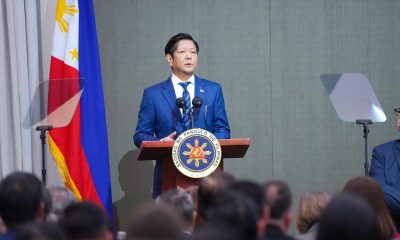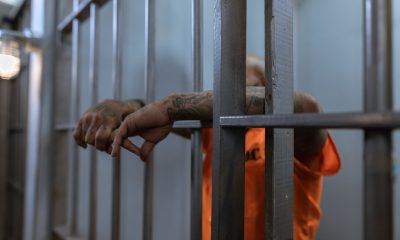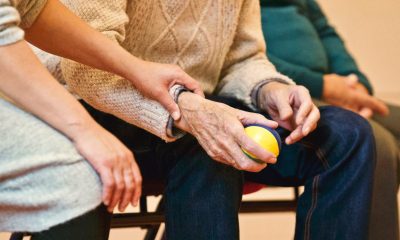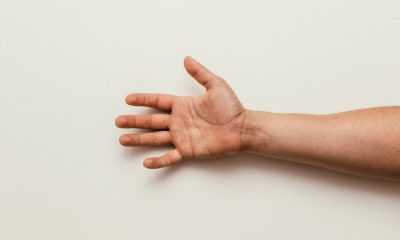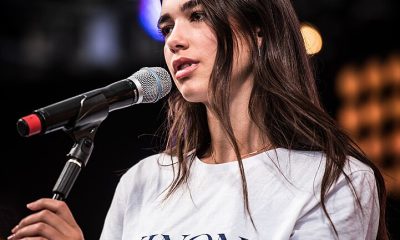Entertainment
Russian baritone Dmitri Hvorostovsky dies at 55
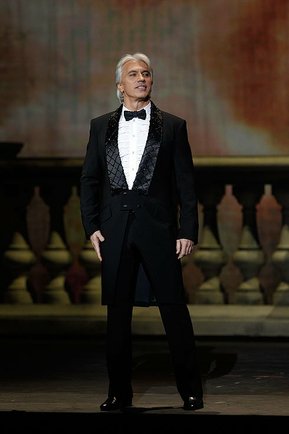
Dmitri Hvorostovsky, the Russian baritone known for his velvety voice, dashing looks and shock of flowing white hair, died Wednesday at a hospice near his home in London, a few years after he was diagnosed with a brain tumour. He was 55. (Photo By Kremlin.ru, CC BY 4.0)
NEW YORK — Dmitri Hvorostovsky, the Russian baritone known for his velvety voice, dashing looks and shock of flowing white hair, died Wednesday at a hospice near his home in London, a few years after he was diagnosed with a brain tumour. He was 55.
Called “the Elvis of opera” and the “Siberian Express” by some, Hvorostovsky announced in June 2015 that he had been diagnosed with the tumour. He returned to New York’s Metropolitan Opera three months later to sing the Count di Luna in Verdi’s “Il Trovatore” and was greeted with a loud and lengthy ovation that caused him to break character. Musicians in the orchestra threw white roses during the curtain calls.
Despite his illness, he sang in Tchaikovsky’s “Eugene Onegin” at London’s Royal Opera that December, in Verdi’s “Simon Boccanegra” and “Un Ballo in Maschera (A Masked Ball)” at the Vienna State Opera the following spring and gave his final four staged opera performances as Giorgio Germont in Verdi’s “La Traviata” in Vienna, the last on Nov. 29 last year. He announced the following month that balance issues had caused him to cancel future opera appearances.
“Dima was a truly exceptional artist — a great recitalist as well as a great opera singer, which is rare,” said soprano Renee Fleming, who teamed with Hvorostovsky for a memorable run of “Onegin” among their many performances. “His timbre, musicality, musicianship, technique, and especially his capacity for endless phrases, were second to none. I have no doubt that he would have sung beautifully for another 20 years or more, had he not been taken from us. I can’t hear Eugene Onegin, Valentin in Faust or Simon Boccanegra without longing to hear Dmitri. He brought an innate nobility and intense commitment to every role.”
Hvorostovsky made a dramatic unscheduled appearance at the Met last May for a gala celebrating the 50th anniversary of the company’s move to Lincoln Center for the Performing Arts. Walking stiffly, looking thin and with his cheekbones more pronounced, Hvorostovsky received a standing ovation and lit into Rigoletto’s second-act aria “Cortigiani, vil razza dannata (Courtiers, vile cursed kind).” Some in the audience had tears in their eyes, and many pulled cellphones from their glittering handbags to snap photos as he walked through the lobby during intermission.
His last public concerts were on June 22 and June 23 at the Grafenegg Festival in Austria. In September, he was awarded the Order of Merit for the Fatherland by Russia President Vladimir Putin for contributions to the nation’s art and culture.
“Words cannot express my anguish that one of the greatest voices of our time has been silenced,” tenor Placido Domingo said. “Dmitri’s incomparably beautiful voice and peerless artistry touched the souls of millions of music lovers. His passing will be mourned by his countless admirers around the world and by those of us who were fortunate to know him.”
The Met dedicated Friday’s performance of Verdi’s Requiem to Hvorostovsky.
“One of opera’s all-time greats, truly an artist for the ages,” Met General Manager Peter Gelb said. “In addition to his astounding vocal gifts, he had an electrifying stage presence and a charisma that won over both his adoring audiences and his devoted colleagues.”
The Vienna State Opera scheduled a minute of silence before Wednesday’s performance of Strauss’ “Salome.”
“I especially admire the wonderful way in which he carried himself during this terrible illness,” Vienna State Opera Director Dominique Meyer said. “Dima leaves a great void behind. He will stay in our memories as an exceptional artist who always gave a hundred per cent.”
Hvorostovsky was born on Oct. 16, 1962, and grew up in Krasnoyarsk, in central Siberia. He started piano lessons when he was 7, only for his first piano teacher to tell him he was untalented. At Krasnoyarsk Pedagogical School and Krasnoyarsk High School of Arts, he thrived in music, boxing and soccer. “Apart from this, I was the worst pupil in school,” he said with a straight face.
He became a soloist at the Krasnoyarsk Opera in 1986, won the Russian Glinka National Competition, then attracted attention by winning vocal contests at Toulouse, France, in 1988 and then Cardiff in 1989 — where he beat out Welsh bass-baritone Bryn Terfel for the top prize.
With long hair that turned prematurely silver before he was 35 and then polar bear white, he was instantly recognizable. Hvorostovky’s public musical persona started with a rock ‘n’ roll band, when he was a teen-age rebel under communism.
“Ah! Freedom! So what could I do?” he remembered in a 1998 interview with The Associated Press. “I had a few options — to become a street fighter, or I could become a hero in front of my girlfriends.”
He made his Royal Opera debut in 1992 as Riccardo in Bellini’s “I Puritani” and his Met debut in 1995 as Prince Yeletsky in Tchaikovsky’s “Pique Dame (The Queen of Spades).” He was lauded around the world for definitive performances as Onegin and also celebrated for the title role in Mozart’s “Don Giovanni,” Valentin in Gounod’s “Faust” and Belcore in Donizetti’s “L’Elisir d’Amore (The Elixir of Love).”
“The sheer beauty of his voice and his matinee-idol good looks made him a favourite with any audience,” Royal Opera music director Antonio Pappano said. “The joy with which he approached performing was unique.”
Hvorostovsky is survived by his wife Florence Hvorostovsky, their son, Maxim, and daughter, Nina, and twins Alexandra and Daniel from his first marriage, to Svetlana Hvorostovsky.


